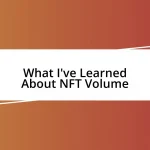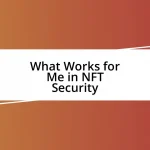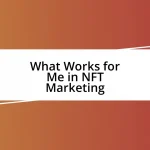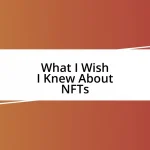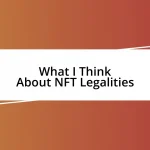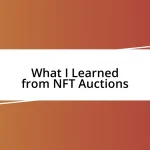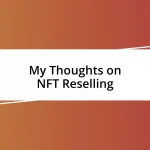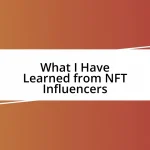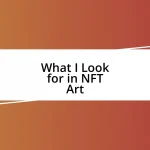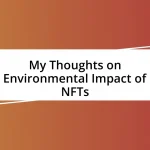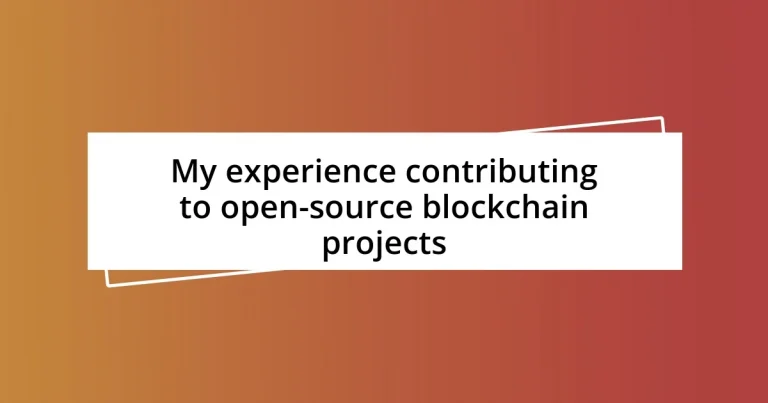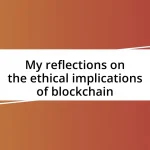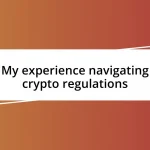Key takeaways:
- Engaging with open source projects fosters personal growth, collaboration, and a sense of belonging within a supportive community.
- Contributing to open source blockchain enhances practical skills while providing networking opportunities and continuous learning experiences.
- Effective contributions stem from understanding project guidelines, communicating openly, and making incremental changes for meaningful impact.
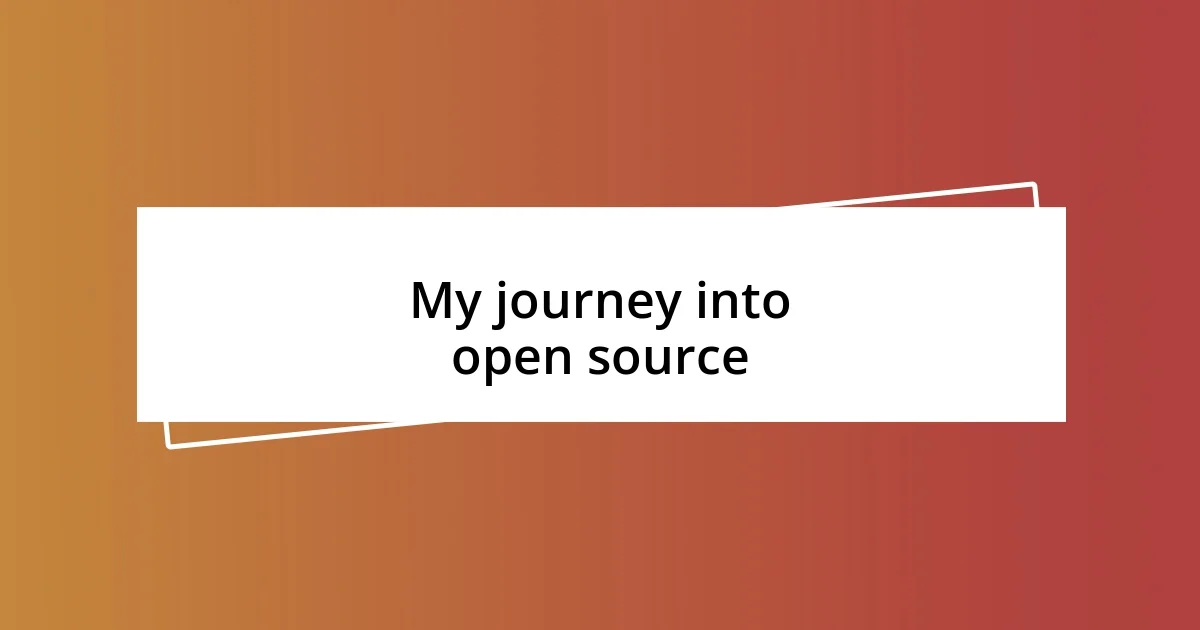
My journey into open source
It all started when I stumbled upon a GitHub repository one night while looking for projects to contribute to. I felt an exhilarating rush of excitement and curiosity, wondering how many people had poured their hearts and minds into this code. Was I ready to be part of something larger than myself?
As I navigated the complexities of that first project, I encountered moments of frustration that felt like climbing a steep mountain. I vividly recall struggling with a bug that seemed insurmountable, but in those moments of challenge, I found a supportive community that offered guidance and encouragement. The emotional high I felt when I finally resolved it was an incredible affirmation of my capabilities.
The more I engaged with open source, the more I began to realize its transformative power—not just for technology but for personal growth. With every contribution, I reflected on what it meant to collaborate, learn, and give back. Isn’t that what we all seek—a sense of belonging and purpose in our endeavors?
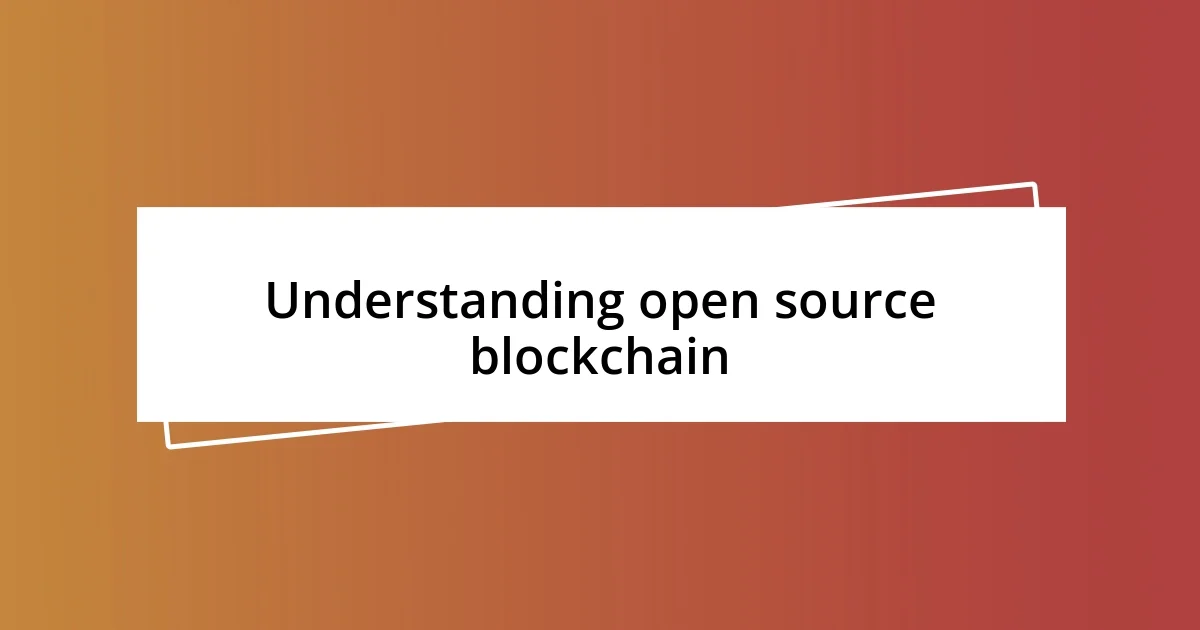
Understanding open source blockchain
Open source blockchain projects invite a diverse range of contributors, making them a fascinating area of study. From my experience, the collaborative nature of these projects means every line of code carries the collective effort of countless developers. It’s inspiring to think that people from all over the world come together, guided by transparency and a shared vision.
One interesting aspect is the transparency inherent in open source projects. For instance, as I dove into a specific blockchain implementation, I marveled at how anyone could view the code, suggest improvements, or report issues. This democratization of technology not only fosters innovation but also builds trust. It creates a space where I felt my voice mattered, reinforcing my commitment to contributing actively.
In my journey, I discovered that participating in these projects nurtured a unique sense of belonging. The community thrives on support, especially when dealing with the intricate and often perplexing world of blockchain technology. I remember feeling a rush of camaraderie during a late-night code review session, where my suggestions were welcomed and respected, illustrating the pivotal role collaboration plays in this dynamic environment.
| Aspect | Open Source Blockchain |
|---|---|
| Transparency | Code is publicly accessible, allowing everyone to contribute and learn. |
| Collaboration | Multiple contributors from diverse backgrounds work together, enhancing innovation. |
| Community Support | A thriving environment where developers help each other resolve challenges. |
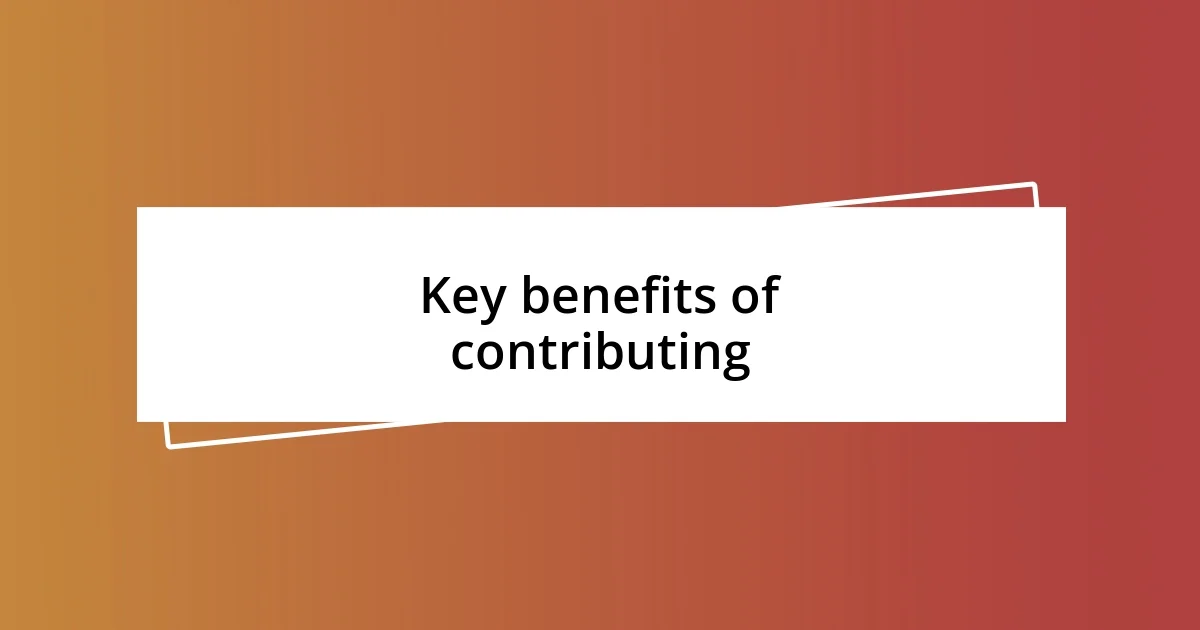
Key benefits of contributing
Contributing to open source blockchain projects has been a game changer for my personal and professional growth. One of the most significant benefits is the practical experience I gained while working alongside seasoned developers. I remember the first time I accepted feedback on my code; it felt like I was being welcomed into a circle of trust. Their constructive criticism not only improved my skills but also boosted my confidence, reinforcing the idea that collaboration can elevate individual contributions.
In addition to skill development, there are intrinsic benefits that stem from being part of a larger movement. I often find myself engaged in lively discussions about innovative solutions or emerging technologies, which fuels my passion for learning. The thrill of brainstorming with diverse minds has reshaped how I approach problem-solving. Here’s a quick list of the key benefits I’ve experienced:
- Skill Enhancement: Exposure to real-world coding challenges helps refine problem-solving abilities.
- Networking Opportunities: Connecting with experts and like-minded individuals broadens professional horizons.
- Confidence Boost: Positive feedback and collaborative support foster a sense of belonging and self-assurance.
- Continuous Learning: Engaging with new technologies keeps me curious and eager to expand my knowledge base.
- Sense of Purpose: Contributing to meaningful projects can be deeply fulfilling, knowing that my work impacts the community.
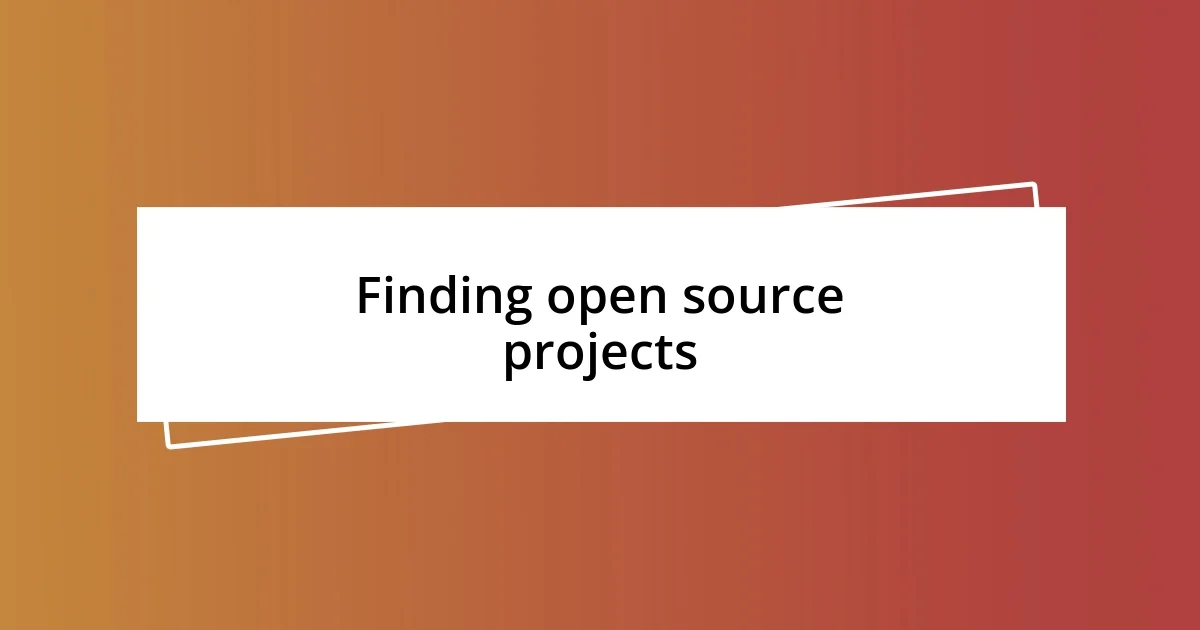
Finding open source projects
Finding open source projects is a journey filled with exploration and discovery. I often start my search on platforms like GitHub, where thousands of projects await. Just a few clicks can lead you down a rabbit hole of innovative ideas and talented developers; it feels like unearthing hidden treasures.
In my quest, I’ve found that joining community forums or channels dedicated to blockchain can be incredibly helpful. Engaging with fellow enthusiasts not only reveals ongoing projects but also fosters connections that can lead to collaboration opportunities. I once stumbled upon a vibrant community on Discord where passionate developers shared their current efforts and support queries; the energy was infectious!
Additionally, attending hackathons has been a fantastic way to uncover open source blockchain initiatives. These events are bustling with activity, and participating allows you to meet project leaders and contributors in real-time. I remember the buzz during my first hackathon—there was excitement in the air, and it became clear that many great projects are just waiting for curious minds like ours to jump in and contribute. Isn’t it thrilling to think about being part of something bigger?
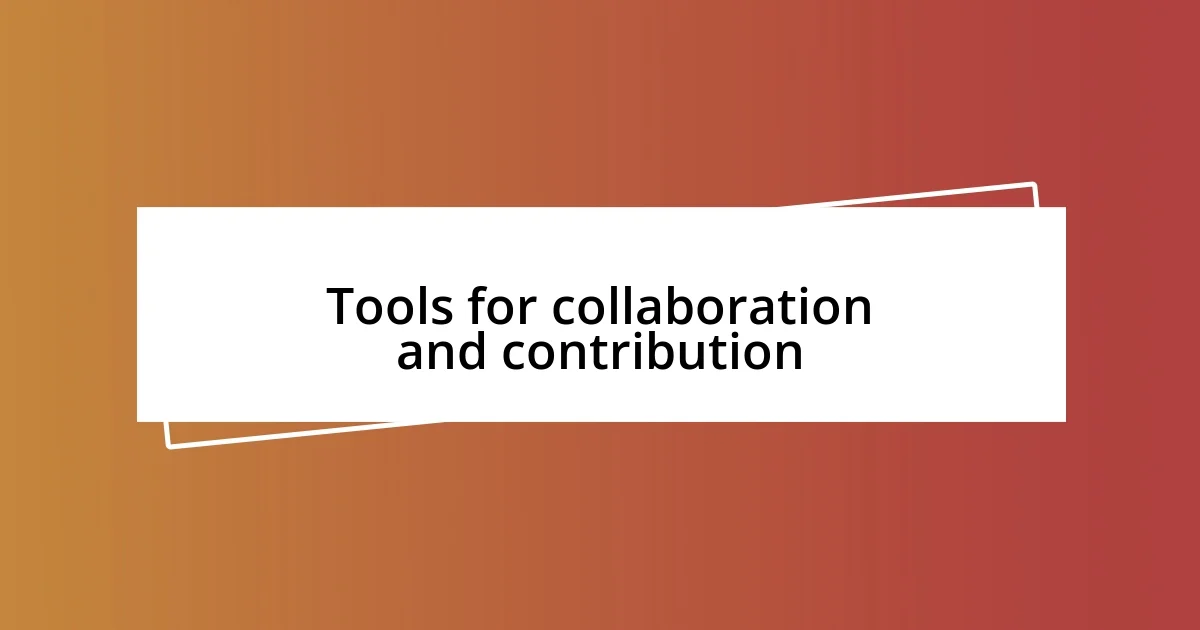
Tools for collaboration and contribution
When it comes to collaboration in open source blockchain projects, tools like GitHub or GitLab are indispensable. I remember the first time I created a pull request; it felt like sending a piece of my creativity into the world. These platforms streamline the collaboration process, making it easy to track changes and manage contributions — it’s like being part of a well-orchestrated symphony where every note counts.
Another incredible tool I’ve embraced is Slack, which fosters real-time communication and keeps the lines open with fellow contributors. Imagine the thrill of brainstorming sessions where ideas bounce around like a volleyball; that’s the energy Slack brings to the table. I’ve found that being able to ask quick questions and share instant updates helps maintain enthusiasm and clarity throughout a project.
Lastly, I can’t overlook the power of online documentation tools like Notion or Confluence. They help create a shared knowledge base, which I found particularly valuable when navigating complex concepts in blockchain. During one of my contributions, having access to well-organized documentation transformed confusion into clarity, allowing everyone to stay on the same page. How often do we underestimate the impact of a good documentation process? It not only saves time but also empowers the entire team to excel together.
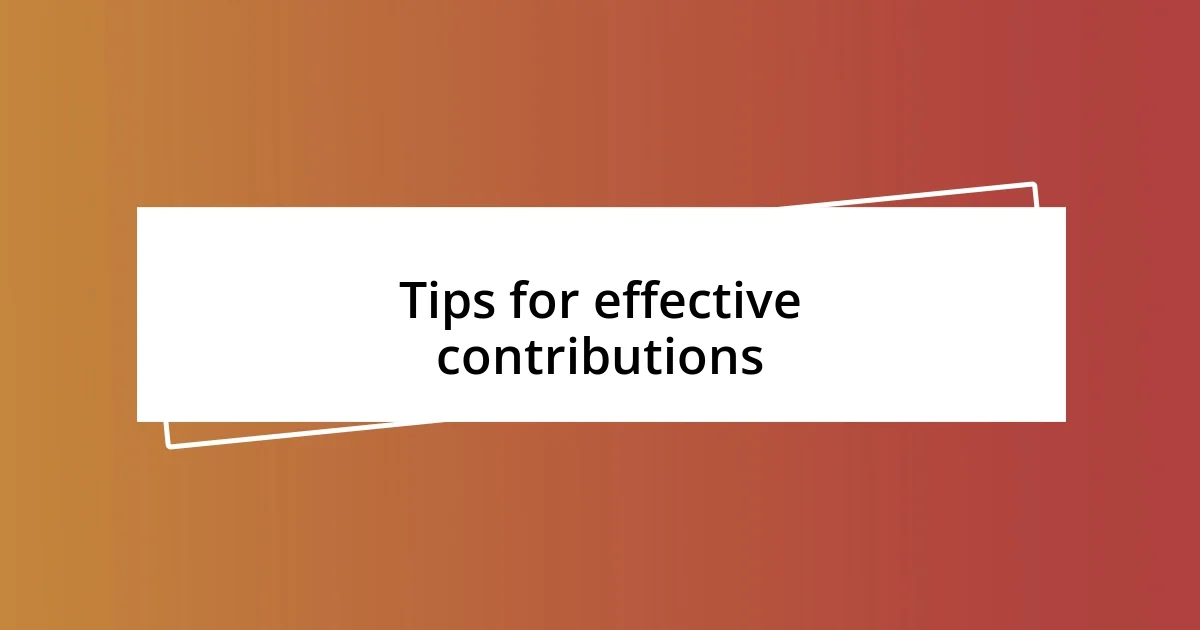
Tips for effective contributions
Making effective contributions to open source projects starts with understanding the project’s guidelines and community culture. The first time I dived into a project, I felt overwhelmed by the sheer amount of information. But taking the time to read the contribution guidelines brought me clarity and direction. Have you ever felt lost in a new environment? That’s exactly how I felt! It’s like setting the foundation of a house; it’s essential for everything that follows.
Communication is key in these collaborative spaces. I remember joining a project where I hesitated to voice my ideas early on. But when I finally shared my thoughts, I discovered that my insights sparked engaging discussions — it was liberating! Wouldn’t it be great to be part of a community where your input really matters? So, don’t shy away from speaking up; your voice might be the catalyst for the next big breakthrough!
Lastly, think iteratively. Instead of trying to make sweeping changes in one go, I’ve found that making small, incremental contributions can be incredibly effective. I once focused on fixing one bug at a time, which eventually led to a deeper understanding of the project. It felt rewarding to see how each small contribution snowballed into significant improvements. Isn’t it fascinating how progress can be built little by little? Embrace the journey, and remember that every bit counts!
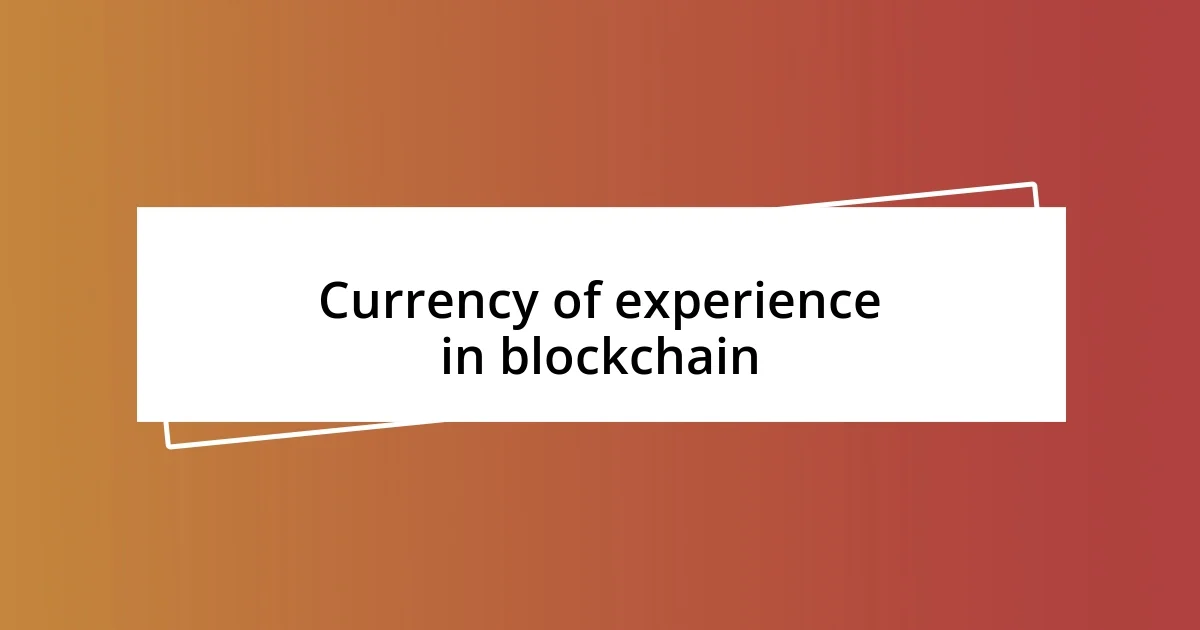
Currency of experience in blockchain
The concept of experience in blockchain projects can often feel like the currency we trade in. I vividly recall my first experience contributing to a blockchain project; I wasn’t just donating my time, but investing my knowledge and skills into something bigger than myself. It can be surprisingly rewarding — don’t you just love that feeling of knowing you’re part of an innovative ecosystem? Each line of code I wrote felt like a step towards mastering a whole new language, and in retrospect, that sense of investment laid the foundation for my growth in this field.
Learning the nuances of blockchain technology can seem daunting initially. I remember grappling with concepts like decentralization and consensus algorithms, feeling like I was trying to decipher an ancient code. But as I engaged with more contributors and immersed myself in discussions, I realized that every challenge I faced was actually an opportunity. It had me wondering: what if every setback is simply a stepping stone toward expertise? Through collaboration, each interaction became a valuable lesson, turning my initial confusion into confidence.
Reflecting on my journey, I see experience in blockchain not just as a collection of technical skills but as a profound evolution of my thought process. Engaging in discussions around governance models or smart contracts shifted my perspective on technology’s role in society. I felt a sense of purpose, realizing that what I was learning had real-world implications beyond the code itself. Does it change how you view your contributions when you see them as part of a larger narrative? For me, that realization transformed my understanding of what it means to be part of the blockchain community.
